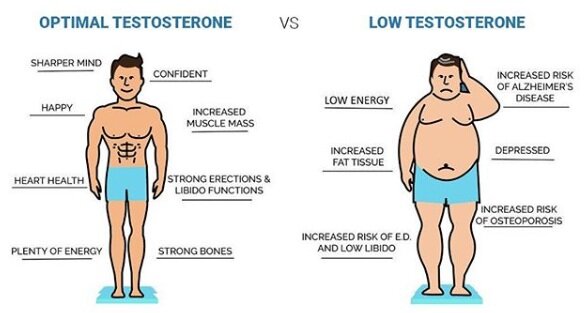What is Low Testosterone? How Low Testosterone Treatment Work?

Testosterone is a steroid hormone that is secreted by the testes as well as the ovaries. It is, therefore, an important hormone for both men and women. The effects of low testosterone or low T are diminished feelings of well-being, decreased sexual function and libido, decreased energy, decreased bone muscle mass and strength, decreased bone density, poorer lipid profile, increased risk for cardiovascular disease and diabetes.
It is a known medical fact that low T or lower testosterone is associated with the aging process. There is a 1.5% decline a year after the age of 30. Treatment of Low t or low testosterone will result in increased quality of life as well as independence.
Testosterone circulates in the blood, both bound and free. There is a fraction of testosterone that circulates bound to SHBG. The SHBG component increases after age 40, as well as with various medications. This subsequently will further cause one to have low T or low testosterone.
Monitoring
Monitoring treatment is essential as a conversion of testosterone is to DHT or dihydrotestosterone and estradiol. The higher the estradiol component, the higher the risk for potential adverse effects (man -boobs). With appropriate treatment and monitoring of low T or low testosterone, this side effect is avoided. Labs that are monitored include Hb, Hct, as well as PSA levels.
Blood Level
When treating low T or low testosterone, goals are to have your blood level at the upper end of the scale when you were 20 years old, not mid-range. Monthly testing may need to be required until optimal. Testosterone is converted to DHT by the 5-alpha reductase enzyme. DHT does have a good effect on libido and energy. It does not convert to estrogen.
Low T or low testosterone treatment is contra-indicated if there is active prostate cancer. Literature supports use in cured prostate cancer with a PSA level less than 1.0, pregnant women, and men with fertility issues.
Symptoms
Recommendations for treatment of low T or low testosterone include anyone with symptoms or signs of deficiency, men or women with libido issues or sexual dysfunction, as well as any man or woman that wishes to improve their quality of life or increase their longevity. These findings are all well documented in Peer Review Medical Journals.
Does Treatment Cause Prostate Cancer?
Regarding the frequently asked question, does testosterone treatment cause prostate cancer? The literature overwhelmingly supports no increased risk of prostate cancer when being treated for low T or low testosterone. It might increase the growth rate if cancer is present. It should be noted that prostate cancer is most common when testosterone levels are low.
Estrogen, a metabolite of being treated for low T or low testosterone, does not cause prostate cancer. It will protect against bone loss and osteoporosis, dementia, heart disease. There are over fifty years of studies to demonstrate that raising testosterone and estrogen levels is not harmful.
Treatment
Treatment for low T or low testosterone may result in an elevation in your red blood cell count. This is not to be confused with Polycythemia Vera, which demonstrates an increased risk of blood clotting and stroke. The phenomenon associated with treatment is known as erythrocytosis. This only causes a rise in your red blood cells and nothing else. This is the same response that one has when living at higher altitudes.
In conclusion, if you are suffering from any symptoms associated with low T or low testosterone, treatment should be initiated early. Your consultation with your anti-aging doctor will determine the best delivery mechanism for you. Remember once again that an independent risk factor for heart disease is low T or low testosterone. I, therefore, ask you. Where do you want your levels to be?
After initiating treatment for low t or low testosterone, you will notice improved lean muscle mass, bone density, decreased cholesterol, improved skin tone, improved healing, as well as increased libido and sexual performance.
Trending Health Topics
- ADHD
- Allergies
- Arthritis
- Bipolar Disorder
- Bunions
- Car Accidents
- Chron's Disease
- Common Cold
- COPD
- Depression
- Dry Skin
- Dry throat
- Eczema
- Fungal Infection
- GERD
- HIV/AIDS
- Hypertension
- Irritable Bowel Syndrome (IBS)
- Multiple Sclerosis
- Osteoarthritis
- Psoriasis
- Rheumatoid Arthritis
- Skin Disorders
- strep throat
- Type 2 Diabetes
- Uncategorized